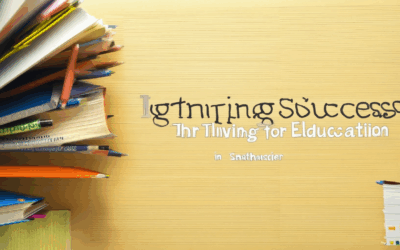Is college transition support legit? The idea of easing the challenges of moving from high school to college has become increasingly popular among students and parents alike. With the pressures of academic rigor, social adjustments, and personal growth, the thought of having a supportive framework to navigate this significant milestone is appealing. But is college transition support a worthwhile investment? The answer lies in understanding the multifaceted challenges students face during their first year and how structured support systems can make a tangible difference. From academic and social adjustments to emotional readiness, effective transition support can play a pivotal role in shaping a student’s college experience. Whether through specialized programs, mentorship, or innovative tools like APIs, the goal is to empower students with the confidence and resources needed to thrive. In this exploration, we delve into what makes transition support legitimate—by examining its benefits, the role of professionals like college transition coaches, and how it aligns with the aspirations of top-performing families. If you’re considering whether to invest in such support, read on to uncover proven strategies and insights that could make your college journey smoother and more rewarding.
Key Takeaways
- Understand College Transition Programs: Learn about support systems designed to help students with ADHD, learning disabilities, or uncertainty about college readiness.
- Who Can Benefit: Targeted for students with learning disabilities, those unsure about college success, and those needing executive function support.
- Why Participate: Gain practical tools, build academic success, develop independence, and join a supportive network.
- How They Work: Access mentorship, workshops on executive functioning, personalized plans, and on-campus support.
- Recommended Resource: Explore Enroll Maven for comprehensive guides and strategies.
- Transition Assistance Program (TAP): A program aiding military veterans with job placement, training, career counseling, and support services.
- Key TAP Services: Includes job placement, vocational training, career coaching, employer initiatives, and mental health resources.
- Role of Transition Coaches: Professionals guiding students in academic and social adjustments for a seamless college experience.
Is College Transitions Legit?
Based on available information and reviews, College Transitions appears to be a legitimate educational resource platform. Here’s a breakdown of the key aspects:
- Reputation Score : College Transitions holds a reputation score of 5, reflecting generally positive feedback from users. This score is derived from aggregated reviews across various platforms, indicating a level of trustworthiness among its users.
- Review Count : The platform has garnered 99 reviews, which is a significant number for an educational resource site. These reviews provide valuable insights into the effectiveness and reliability of the platform.
- Outcome Results : While the reputation score is strong, there is a noted discrepancy in outcome results, which have a score of 2. This suggests that there may be limited data or mixed results regarding the platform’s effectiveness in achieving specific academic goals.
- Competitor Comparison : When compared to other educational platforms, College Transitions stands out for its focus on student support and academic success. While there are several competitors in the market, College Transitions offers unique features that set it apart, particularly in terms of community engagement and resource availability.
For more information, you can visit the official College Transitions website .
This overview highlights the platform’s legitimacy and its position in the competitive landscape of educational resources.
What is Transition Support?
Transition support refers to the assistance provided by one entity to another during a change in operations, management, or service delivery. This support aims to ensure a smooth transition by addressing potential challenges and maintaining continuity.
Key Components of Transition Support
- The transitioning organization or individual
- The supporting entity or provider
- The scope of the transition process
Types of Transition Support
- Training programs and workshops
- Knowledge transfer sessions
- Temporary staffing solutions
- Access to critical resources and tools
- Documentation and guidelines
- IT and technical support
- Consultancy services
Why Transition Support Matters
- Minimizes operational disruption
- Ensures business continuity
- Protects organizational assets
- Fosters stakeholder confidence
Where Do the Top 1% Send Their Kids to College?
The top 1% of earners typically choose colleges that align with their socio-economic status, offering the best resources, networking opportunities, and academic rigor. Here are some of the most sought-after institutions:
- Harvard University – Known for its prestigious reputation and endowment, Harvard attracts students from affluent backgrounds.
- Yale University – A leading private institution with a long history of admitting wealthy students and offering extensive financial aid programs.
- Stanford University – Renowned for its technology and engineering programs, Stanford draws high achievers from wealthy families.
- Princeton University – Another top-tier private university with a legacy of admitting students from privileged backgrounds.
- Massachusetts Institute of Technology (MIT) – Famous for its STEM programs, MIT is a favorite among tech-savvy students from affluent families.
- Cornell University – Located in Ithaca, NY, Cornell offers a mix of affordability through robust financial aid and access to elite networks.
- University of Pennsylvania (Penn) – Known for its Wharton Business School and strong overall academic standing, Penn attracts wealthy students.
- Johns Hopkins University – A private research university with a reputation for excellence, drawing students from affluent families.
- Georgetown University – Located in Washington, D.C., Georgetown is a top choice for students seeking political and business connections.
- Syracuse University – Offers a strong combination of academic rigor and social opportunities, appealing to high-income students.
Additionally, many wealthy families consider boarding schools for their children’s education. Schools like Exeter Academy and Deerfield Academy are popular among the elite due to their exceptional academic programs and strong alumni networks.
For international options, students may attend prestigious institutions like Eton College in the UK or Sydney Grammar School in Australia, which are known for their elite student bodies.
What is a College Transition Program?
A college transition program is designed to assist students in making a successful shift from high school to college life. These programs often cater to individuals who may face unique challenges, such as those with learning disabilities, ADHD, or those uncertain about their readiness for college. The primary goal of these programs is to provide support in developing essential skills and confidence needed for academic success.
Who It’s For
College transition programs typically target: – Students diagnosed with ADHD or other learning disabilities. – High school graduates who are unsure about their ability to succeed in college. – Individuals needing assistance with executive function skills, such as time management, organization, and decision-making.
Benefits
The advantages of participating in a college transition program include: – Gaining practical tools and strategies for managing college life. – Building a strong foundation for academic success. – Developing independence and self Advocacy skills. – Accessing a supportive network of peers and mentors.
How It Works
Most transition programs operate by: – Providing structured mentorship and guidance. – Offering workshops and resources focused on executive functioning. – Creating a personalized plan tailored to individual needs. – Connecting participants with on-campus support services.
Resources
For further exploration, consider visiting Enroll Maven , which offers comprehensive resources and tips for students navigating the transition to college. Their platform provides valuable insights and strategies to help you thrive in this new chapter of your journey.
By participating in a college transition program, you can gain the confidence and skills needed to embrace the challenges of college life head-on.
What Does the Transition Assistance Program Do?
The Transition Assistance Program (TAP) is designed to support military service members as they transition from active duty to civilian life. Administered by the Department of Labor’s Veterans’ Employment and Training Service (VETS), TAP provides resources, training, and employment services to help veterans navigate the challenges of re-entering the workforce.
Key Functions of the Transition Assistance Program
- Job Placement Services: TAP offers career counseling, resume building, and job placement assistance to help veterans find suitable civilian positions. They connect veterans with employers who are eager to hire individuals with military backgrounds.
- Training Programs: The program provides vocational training and skill development courses to enhance employability. These training opportunities often focus on in-demand fields and industries.
- Career Counseling: Veterans can access one-on-one career coaching to explore career options, set goals, and develop a plan for successful transitions.
- Employer Initiatives: TAP works with businesses to create job opportunities and provide internships for veterans. Some companies offer priority hiring to veterans.
- Support Services: The program also provides resources for mental health, financial planning, and family adjustment to support the overall well-being of veterans and their families.
For more detailed information about how TAP can assist you, visit our Veteran Resources page or explore our Job Training Programs section.
What is a College Transition Coach?
A college transition coach is a professional who assists students in navigating the challenges of moving from high school to college. These coaches provide guidance in various areas, including academic preparedness, course selection, standardized test preparation, and social adjustment. Their primary goal is to help students build the necessary skills and confidence to succeed in college.
Transition coaches may work with students individually or in group settings, offering tailored advice and strategies. They often focus on areas such as time management, study habits, and stress management, which are crucial for college success. Some coaches specialize in particular domains, such as academic support or personal development, while others take a broader approach.
These professionals can be found in schools, colleges, or as independent consultants. They collaborate with educators, counselors, and other stakeholders to ensure a smooth transition for students. By addressing both academic and personal challenges, transition coaches play a vital role in empowering students to thrive in college and beyond.









0 Comments